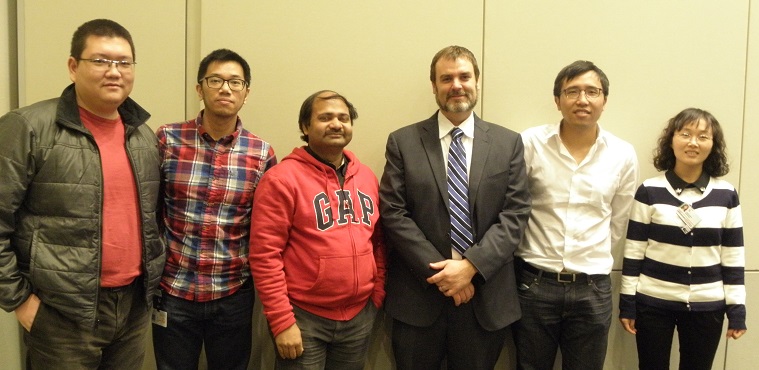
 Chad Huff, Ph.D.
Chad Huff, Ph.D.
Assistant Professor, Department of Epidemiology
Ph.D., Biological Anthropology, University of Utah
Research in the Huff Lab is concentrated on understanding human evolution and the genetic basis of human disease through statistical, computational, and population genomics. Our work spans a number of human genetics subdisciplines, including disease-gene identification, mutation rate estimation, detection of recent positive selection, and reconstruction of demographic history. We are currently focused on developing new methods to analyze genomic data and by applying these methods to discover novel insights about the genetic basis of human disease, with particular emphasis on identifying and characterizing genes that increase the risk of developing common cancers (colon, breast, head and neck, lung, pancreatic, prostate, and thyroid).

 Ryan Bohlender, Ph.D.
Ryan Bohlender, Ph.D.
Department of Epidemiology
Ph.D., Biological Anthropology, University of Utah
Ryan Bohlender is a population geneticist, originally trained in anthropology at the University of Utah. His dissertation included a model of admixture between modern humans, Neanderthals, and Denisovans. Now, he is working to understand sources of heritable cancer risk. His interests include statistical genetics and software development.

 Hao Hu, Ph.D.
Hao Hu, Ph.D.
Odyssey Fellow, Department of Epidemiology
Ph.D., Human Genetics, University of Utah
Research interests include developing new burden test algorithms for finding disease-causing genes in humans, namely, the Variant Annotation, Analysis, and Search Tool (VAAST). VAAST is a probabilistic search tool that finds damaged genes and causal variants using whole-genome or exome sequencing data. To date, VAAST has been used to identify causal variants for rare Mendelian diseases (e.g. Miller Syndrome and Ogden syndrome) and common, complex genetic diseases (e.g. breast cancer, Crohn diseases and hypertrilyceridemia), proving it is a robust software package that is highly accurate for both Mendelian and complex genetic diseases. Current efforts include incorporating support for family-based association study into the VAAST package (pVAAST), which makes uses of both case-control study design and pedigree sequencing data, achieving higher statistical power compared to transitional linkage analysis.

 Fulan Hu, Ph.D.
Fulan Hu, Ph.D.
Visiting Scientist, Department of Epidemiology
Ph.D., Epidemiology, Harbin Medical University (China)
Research interests include understanding the genetic basis of human disease through epidemiological, statistical and bioinformatics methods. Previous research focused on the detection of variants, SNPs, CpG island methylation and CNVs in colorectal cancer. Current work is identifying driver genes for breast cancer from whole genomic sequencing data.

 Shankaracharya, Ph.D.
Shankaracharya, Ph.D.
Post-doctoral Fellow, Department of Epidemiology
Ph.D., Technology, Birla Institute of Technology, Mesra, Ranchi (India)
Research interests include applying machine-learning algorithms to gain insight into disease-causing genes. Shankar is also working on large-scale, next generation sequencing data analysis of various cancer datasets.

 Yao Yu, Ph.D.
Yao Yu, Ph.D.
Post-doctoral Fellow, Department of Epidemiology
Ph.D., Shanghai Institutes for Biological Sciences, Chinese Academy of Sciences
Research interests include genetics and genomics studies, transcriptome studies with high-throughput data analysis methodology and application. Previous research studies were mainly focused on the analysis of high-throughput omics data, including developing algorithms and computation applications of NGS studies and evolutionary biology. Human transcriptome study is also one of the research interests, including coding and non-coding gene expression level study, and post-transcription regulation (i.e. RNA editing, trans-splicing). Currently, focusing on cancer studies to discover genetic basis of diseases (cancer: breast, melanoma, ovarian, colon) using association analysis tools on NGS data.

 Jiun-Sheng (Roger) Chen
Jiun-Sheng (Roger) Chen
Ph.D. student, The University of Texas Graduate School of Biomedical Sciences at Houston
Research interests include understanding human disease through statistical and bioinformatics means. Current work is to identify the causal genes in Crohn’s disease from whole genomic sequencing data.

 Shan Chen
Shan Chen
Ph.D. in Molecular and Human Genetics, Baylor College of Medicine
Master of Science candidate, University of Texas Houston School of Public Health
Research interests include combining molecular technologies and statistical analysis to advance new drug and therapeutic developments as well as disease prediction and prevention.
Previous experience includes analysis of Next-Generation-Sequencing data in Dr. Brendan Lee's lab at Baylor College of Medicine. Research has previously focused on osteosarcoma and understanding transcription factor functions in cartilage cell differentiation.
Shan Chen is currently pursuing a Master's degree in Biostatistics with a focus on molecular biology and NGS preparation. Computing background includes Python, R, SAS, and Stata.

 Loni Huff
Loni Huff
Site Administrator
B.S., Information Systems, Louisiana State University
Administration of the Huff Lab web site is handled by Loni Huff whose technical background includes .NET, MVC, C#, JavaScript, SQL, and WordPress. Loni also serves as an Applications Systems Analyst at MD Anderson Cancer Center.
